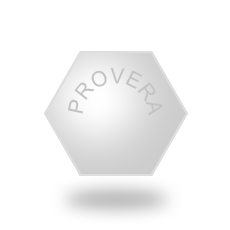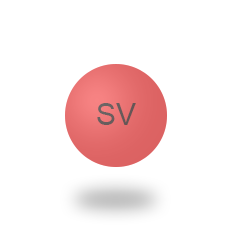Aygestin
Aygestin is generically known as norethindrone. Medication contains the progestin hormone and works by changing the uterine lining.

Uses
Generally this medicine is used for the treatment of uterine disorders and menstrual problems such as endometriosis, abnormal bleeding in women.
How To Use
For treatment of premenstrual syndrome and mastodynia it is recommended to take 5 mg from the 16th day of the cycle for 10 days. In case of severe decompensated form and insufficient effectiveness, a course of 5 mg starting from the 5th day of the cycle for 21 days is used. For endometriosis in women over 40 years of age, it is recommended to take 5 to 10 mg per day from the 16th to the 25th day of the cycle for 6 months. For adenomyosis, a course of 5 mg per day from day 5 to day 25 of the cycle for 6 months or starting with 2.5 mg per day on day 5 of the cycle, followed by a gradual increase of 2.5 mg every 2 to 3 weeks for 4 to 6 months is prescribed. In order to postpone the onset of menstruation, it is suggested to take 5 mg 1-2 times a day, starting 3 days before the expected menstruation, for no more than 10-14 days. For cessation of dysfunctional uterine bleeding, use of 5-10 mg for 6-12 days is recommended. Prevention of recurrences is carried out with the use of 5 mg / day from the 16th to 25th day of the cycle. After surgery for glandular cystic hyperplasia it is recommended to take 5-10 mg from the 16th to the 25th day of the cycle for 4-6 months. For lactation suppression, the use of 20-10 mg is envisaged, with a gradual decrease in dose. In case of use as contraception, the drug is taken in combination with estrogens, 1.25-2.5 mg from the 1st-5th day of the cycle for 21 days, followed by a break for 7 days.
Side Effects
All the medications show some side effects, but several patients have no or very few side effects. Notify your doctor right away if you notice the worsening of these common side effects: changes in menstrual cycle, acne, spotting, breakthrough bleeding, pain, hot flashes, trouble sleeping, weight gain, fever, missed periods, drowsiness, dizziness, headaches, nervousness, rashes, nausea, weight loss, stomach pain.
Get immediate medical attention if any of the subsequent severe side effects are observed while using Aygestin: severe hypersensitive reactions- hives, skin rashes, difficulty breathing, itching, chest tightness, swollen face/mouth/tongue/lips, depression, chest pain, migraine, breast lumps, slurred speech, severe headache, loss of vision, loss of coordination, shortness of breath, visual disturbances, dizziness, swollen ankles or fingers, fainting, tenderness, swelling, pain in calf, weakness, vomiting, numbness, yellowish eyes or skin, dark urine, jaundice.
Contraindications
Let your health care provider know if you are suffering from any of the following medical conditions:
- If you are utilizing any prescribes, non prescribed drugs, dietary supplements or herbal preparations.
- If you are pregnant or trying to conceive or are breast-feeding
- If you are allergic to foods, medicines and other products.
- If you have migraines, seizures, kidney diseases, epilepsy, heart problems, or depression.
- If you have a family or personal history of diabetes, high blood pressure, high blood cholesterol, blood clots or lupus.
- If you are overweight or if you smoke.
- If you are hypersensitive to any ingredient of Aygestin.
- If you have undiagnosed unusual vaginal bleeding
- If you have a history of severe blood clots, blood clotting issues such as in the eyes, lungs or legs.
- If you have a history of breast cancer or some blood vessel problems such as heart attack, bleeding in the brain or stroke.
- If you have liver dysfunction or active liver disorder.
Aygestin may be responsible for dizziness. This effect may worsen if taken along with certain drugs or alcohols. Use Aygestin carefully. Do not operate machine or drive during the intake of this medicine. Aygestin may cause dark skin blotches and patches on the face.
Pregnancy And Aygestin
Do not take Aygestin during the gestation period. If you think that you are pregnant then consult your physician or doctor right away. Aygestin can be excreted into the human milk. Thus do not breast-feed a nursing baby while using this medicine.
Related Drugs
Provera
Conditions:
Menopause and HRT

Prometrium
Conditions:
Menopause and HRT

Take Progestin To Prevent Pregnancy
Menstrual cycle is a process that occurs once every month to prepare a woman’s body for pregnancy. This is controlled by the hormonal changes. The reproductive organs which are affected by the menstrual cycle include the uterus, cervix, vagina, fallopian tubes and the ovaries. The ovaries produce two main hormones called Oestrogen and Progesterone. The oestrogen causes the ovaries to release an egg. This process is called Ovulation. Sexual intercourse during this period, the sperms from the man can fertilize the egg and initiate the beginning of pregnancy. In case the egg is not fertilized, the levels of the two hormones drop, causing menstruation. The most effective birth control pills are a combination of oestrogen and progestin. These maintain the levels of hormones inside the body at constant levels, thus preventing the onset of ovulation. For the highest protection against pregnancy, it is important to take progestin-only pills at the same time every day. Typically, birth control pills are effective about 92% of the times.
This animated video gives a proper explanation of the ovulation process and explains about the birth control pills. The most common of the birth control pills contains estrogen and progestin; and also how these pills avoid the production of egg which stops ovulation. The video also explains about two kind of pills i.e combination pills and progestin pills.



